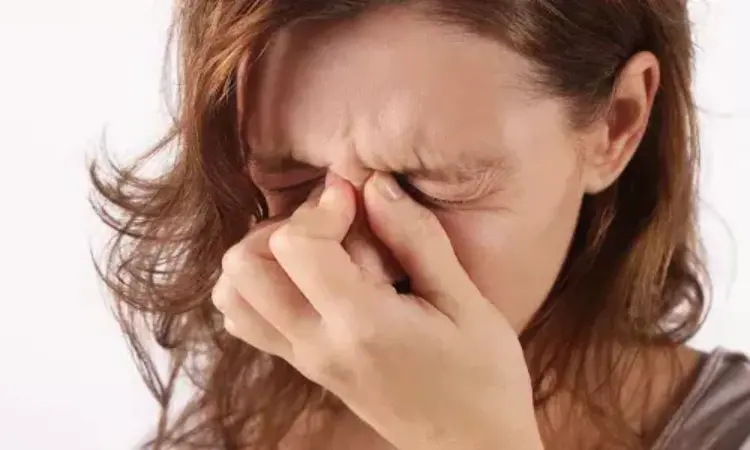- Home
- Medical news & Guidelines
- Anesthesiology
- Cardiology and CTVS
- Critical Care
- Dentistry
- Dermatology
- Diabetes and Endocrinology
- ENT
- Gastroenterology
- Medicine
- Nephrology
- Neurology
- Obstretics-Gynaecology
- Oncology
- Ophthalmology
- Orthopaedics
- Pediatrics-Neonatology
- Psychiatry
- Pulmonology
- Radiology
- Surgery
- Urology
- Laboratory Medicine
- Diet
- Nursing
- Paramedical
- Physiotherapy
- Health news
- Fact Check
- Bone Health Fact Check
- Brain Health Fact Check
- Cancer Related Fact Check
- Child Care Fact Check
- Dental and oral health fact check
- Diabetes and metabolic health fact check
- Diet and Nutrition Fact Check
- Eye and ENT Care Fact Check
- Fitness fact check
- Gut health fact check
- Heart health fact check
- Kidney health fact check
- Medical education fact check
- Men's health fact check
- Respiratory fact check
- Skin and hair care fact check
- Vaccine and Immunization fact check
- Women's health fact check
- AYUSH
- State News
- Andaman and Nicobar Islands
- Andhra Pradesh
- Arunachal Pradesh
- Assam
- Bihar
- Chandigarh
- Chattisgarh
- Dadra and Nagar Haveli
- Daman and Diu
- Delhi
- Goa
- Gujarat
- Haryana
- Himachal Pradesh
- Jammu & Kashmir
- Jharkhand
- Karnataka
- Kerala
- Ladakh
- Lakshadweep
- Madhya Pradesh
- Maharashtra
- Manipur
- Meghalaya
- Mizoram
- Nagaland
- Odisha
- Puducherry
- Punjab
- Rajasthan
- Sikkim
- Tamil Nadu
- Telangana
- Tripura
- Uttar Pradesh
- Uttrakhand
- West Bengal
- Medical Education
- Industry
Hormone replacement therapy tied to decreased utilization of sinus surgery in older women with chronic rhinosinusitis: Study

USA: A recent study published in The Laryngoscope has shed light on the effect of hormone replacement therapy (HRT) on chronic rhinosinusitis (CRS) management.
Analyzing data from over 65,000 women aged 55 or older, the study found that those undergoing HRT were significantly less likely to require endoscopic sinus surgery (ESS) for chronic rhinosinusitis treatment versus those not on HRT (OR: 0.28). This effect was particularly pronounced in patients with nasal polyps. However, hormone replacement therapy was associated with higher antibiotic utilization.
Chronic rhinosinusitis is a disease that represents a significant health burden, estimated to affect 1.0–12.1% globally. CRS patients have been found to have worse quality-of-life scores versus those with chronic obstructive pulmonary disease and congestive heart failure. Kevin Hur, Keck School of Medicine of the University of Southern California, Los Angeles, California, USA, and colleagues aimed to investigate whether hormone replacement therapy impacts healthcare resource utilization in the management of chronic rhinosinusitis in older women.
The study included women 55 years or older with a diagnosis of CRS using the TriNetX US health record database and followed for three years. The cohort was stratified into two groups: women who received HRT at the beginning of the study were compared to women who did not receive HRT.
The groups were matched by race, age, history of asthma, ethnicity, and history of nasal polyps. Outcomes included whether the patient underwent endoscopic sinus surgery and the frequency of antibiotic use. Kaplan–Meier analysis, measures of association, and cohort descriptive statistics were calculated.
The researchers reported the following findings:
- Of the 65,400 women included, the mean age was 66.9 years. 27.0% and 3.6% of patients had a history of asthma or nasal polyps, respectively.
- 2.0% of CRS patients underwent ESS, with the HRT group less likely to undergo ESS [OR: 0.28] versus patients who did not receive HRT.
- When stratified by polyp status, HRT patients with nasal polyps had a greater decrease in ESS rates compared to control than HRT patients without nasal polyps.
- The HRT group had a higher mean number of antibiotic prescriptions compared to the non-HRT group.
In conclusion, postmenopausal CRS patients concurrently receiving hormone replacement therapy are less likely to undergo endoscopic sinus surgery but receive more antibiotic prescriptions.
CRSwNP-HRT patients when stratified by polyp status have a greater decrease in ESS rate versus patients with CRSsNP-HRT.
"There is a need for further research investigating potential immunologic mechanisms behind this effect and how menopause itself may affect disease burden to improve care within this population," the researchers wrote.
Reference:
Herrera, K., Parikh, M., Vemula, S., & Hur, K. Effect of Hormone Replacement Therapy on Chronic Rhinosinusitis Management. The Laryngoscope. https://doi.org/10.1002/lary.31433
Dr Kamal Kant Kohli-MBBS, DTCD- a chest specialist with more than 30 years of practice and a flair for writing clinical articles, Dr Kamal Kant Kohli joined Medical Dialogues as a Chief Editor of Medical News. Besides writing articles, as an editor, he proofreads and verifies all the medical content published on Medical Dialogues including those coming from journals, studies,medical conferences,guidelines etc. Email: drkohli@medicaldialogues.in. Contact no. 011-43720751


